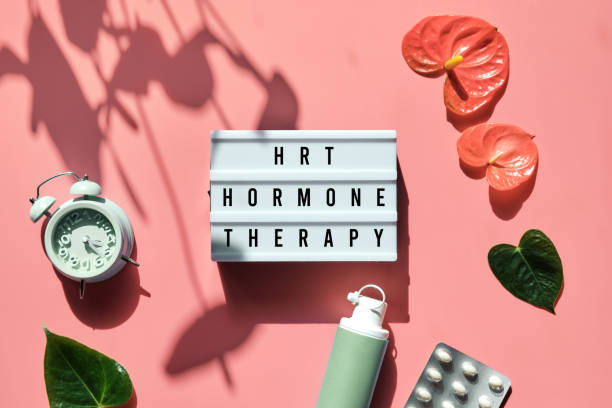Does Taking Estrogen Delay Menopause?

Estrogen is a group of steroid hormones that play a key role in the development and functioning of the female reproductive system and secondary sexual characteristics in females. There are several different types of estrogen, but the three primary ones are:
1. Estradiol: This is the most potent and prevalent form of estrogen in women of childbearing age. It is produced primarily by the ovaries, although smaller amounts are also synthesized by the adrenal glands and fat cells.
2. Estrone: This form of estrogen is most commonly found in postmenopausal women. It is produced in smaller quantities by the ovaries and adrenal glands and is also formed from estradiol in various tissues.
3. Estriol: Estriol is a weaker form of estrogen that is most abundant during pregnancy. It is produced by the placenta and helps support the development of the fetus.
Estrogen plays a crucial role in various aspects of female physiology, including:
1. Regulation of the menstrual cycle: Estrogen levels fluctuate during the menstrual cycle, helping to regulate ovulation and prepare the uterine lining for possible implantation of a fertilized egg.
2. Development of secondary sexual characteristics: Estrogen contributes to the development of breast tissue, a curvier body shape, and the growth of pubic and underarm hair during puberty.
3. Maintenance of bone density: Estrogen helps to maintain bone density in women, and a decline in estrogen levels during menopause can lead to bone loss and an increased risk of osteoporosis.
4. Regulation of cholesterol levels: Estrogen can influence lipid metabolism and help maintain healthy cholesterol levels.
5. Mood and cognition: Estrogen may have an impact on mood and cognitive function, and fluctuations in estrogen levels can contribute to mood swings and changes in cognitive performance during the menstrual cycle and menopause.
In addition to its primary role in the female reproductive system, estrogen also has effects in males, albeit in lower concentrations. Men produce small amounts of estrogen, primarily through the conversion of testosterone to estradiol by the enzyme aromatase. Estrogen is important for various physiological functions in men, including bone health and cardiovascular health.
What is menopause?
Menopause is a natural biological process that signifies the end of a woman’s reproductive years. Typically occurring in the late 40s or early 50s, menopause is characterized by the permanent cessation of menstruation, marking the conclusion of fertility. This transition is primarily driven by hormonal changes, particularly a decline in the production of estrogen and progesterone by the ovaries. As a result, women often experience a range of symptoms such as hot flashes, mood swings, sleep disturbances, and changes in sexual function. Additionally, the decline in estrogen levels can impact bone health and cardiovascular health, making menopause a significant life stage that requires attention to overall well-being.
While menopause is a natural part of aging and not a medical condition, its symptoms can vary widely among individuals. Some women may have relatively mild experiences, while others may find their quality of life significantly affected by the physical and emotional changes associated with menopause. Recognizing the unique nature of this transition, many women seek medical advice and treatment options, including hormone replacement therapy (HRT) or lifestyle adjustments, to manage their symptoms effectively.
Does Taking Estrogen Delay Menopause?
No, estrogen therapy does not prevent or delay the onset of menopause. Estrogen therapy, also known as hormone replacement therapy (HRT), involves taking medications that contain synthetic or naturally derived estrogen. This treatment is often prescribed to alleviate the symptoms of menopause, such as hot flashes, night sweats, and vaginal dryness. However, estrogen therapy does not prevent or delay the onset of menopause.
Here are some important things you should know about estrogen therapy and menopause based on studies:
1. Symptom Relief: Estrogen therapy is highly effective at reducing the unpleasant symptoms associated with menopause. Many women report significant relief from hot flashes, mood swings, and vaginal discomfort when taking estrogen.
2. Ovarian Function: Estrogen therapy does not affect the underlying cause of menopause, which is the decline in ovarian function. The ovaries continue to age and decrease hormone production despite estrogen supplementation.
3. Timing Matters: The timing of estrogen therapy is crucial. It is most effective when started shortly after the onset of menopause symptoms. This is known as “early menopause hormone therapy.”
4. Risks and Benefits: While estrogen therapy can offer relief from menopausal symptoms, it is not without risks. Long-term use of estrogen may be associated with an increased risk of certain health issues, including breast cancer, blood clots, and stroke. It’s essential to discuss these potential risks and benefits with a healthcare provider.
Is there a medical procedure that could delay menopause by 20 years?
According to a 2019 report a medical procedure launched by IVF specialists in Britain aims to delay menopause by up to 20 years. The procedure involves removing and freezing a small piece of ovarian tissue, which can later be grafted back into the body when the woman enters menopause. The frozen tissue can potentially restore declining hormone levels, effectively halting the onset of menopause. This procedure, offered through ProFam, a Birmingham-based company, costs between £7,000 and £11,000 and is available to women up to the age of 40.
The primary goal of this procedure is to provide relief for women who face serious health issues related to menopause, such as heart conditions and osteoporosis. However, it could also benefit millions of other women by delaying the onset of common menopausal symptoms, including mood swings, anxiety, hot flashes, and a reduced sex drive. The success of the procedure in postponing menopause depends on factors such as the age at which the tissue is taken and when it is reimplanted. While it has the potential to extend the time women spend in the menopausal stage, questions remain regarding its safety and effectiveness. Additionally, it may have implications for fertility treatments and offer women more options for family planning in the future.
Conclusion
In summary, taking estrogen does not delay menopause, as it does not affect the underlying biological processes leading to this natural life stage. Instead, estrogen therapy is prescribed to alleviate the symptoms associated with menopause, providing much-needed relief for many women.
If you are considering estrogen therapy to manage your menopausal symptoms, it is essential to consult with a healthcare provider who can assess your individual health status and help you make an informed decision. While estrogen therapy can be beneficial for symptom relief, it should be used cautiously, taking into account potential risks and benefits, as well as the timing of treatment. Ultimately, the decision to pursue estrogen therapy should be based on your unique circumstances and in consultation with your healthcare team.





